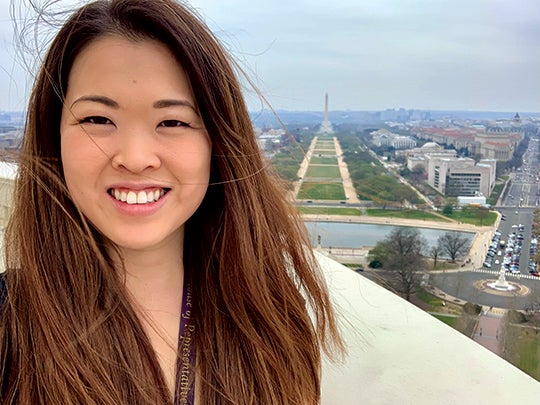Science in Public Service
In the halls of Congress, Melody Tan works for a healthier and more equitable future.

Fall 2023
By Alexander Gelfand
Melody Tan ’14, ’21 remembers when she realized that she wanted to work on Capitol Hill — and that she might actually be able to do it.
It was 2019, and Tan was in Washington, D.C., working on health care policy at the National Academies of Sciences, Engineering and Medicine. “It was the first time I got to dive deep into the policy ecosystem,” she says. “And it really showed me how nonlinear policy careers are.”
That adjective certainly applies to Tan’s own career. She’s now the senior policy adviser to a Democratic congresswoman from Virginia with a portfolio that includes health, energy, climate and the environment — and anything that comes before the House Science, Space and Technology Committee, which oversees more than $42 billion in federal research and development funding and holds hearings on topics ranging from artificial intelligence to quantum computing. “I didn’t come to Congress intending to work on science issues,” Tan says. “But that is where life took me.”
I didn’t come to Congress intending to work on science issues. But that is where life took me.
Growing up in Texas, Tan started college wanting to become a doctor. At Rice, however, she discovered that she preferred engineering classes to premed ones and decided to pursue bioengineering. The 2016 election cycle, which coincided with the start of her doctoral program, prompted a political awakening, and Tan began knocking on doors for campaigns at the county, state and national levels and registering voters.
By the time she had completed her doctorate, Tan was certain she wanted to tackle health care policy. She spent almost a year working on health care and mental health in the office of one of Minnesota’s two Democratic senators and used that experience to land her first permanent position as a legislative staffer. There, Tan also found herself supporting work on environmental justice and the House Energy and Commerce Committee.
“My role involves taking a ton of meetings with constituents from our district as well as just about any entity that wants to reach out to a member of Congress about any issue,” she says. “I get a sense of what the ‘ask’ is for my boss, and I evaluate whether that aligns with her priorities.”
One of those priorities — namely, advancing equity and diversity in the workforce — reconnected Tan to her background in scientific research. The committee held a hearing on the National Science Foundation budget, and the topic of financial instability among graduate and postdoctoral researchers came up. The result was legislation that Tan helped introduce this past June. The bill aims to relieve the economic stresses that prevent graduate and postdoctoral researchers — especially researchers from underrepresented communities — from pursuing careers in STEM fields. “Those are issues that I understand really well from my personal experience,” says Tan.
The process further emphasized just how much legwork is involved in advancing good policy. She spent countless hours consulting with stakeholder groups as she worked to introduce the bill. Even now, the job is hardly finished: “Getting a bill introduced is only the first step,” says Tan, who often finds herself working nights and weekends when the House is in session. “It’s definitely a long game.”
She says, “When you see a bill signed into law, it didn’t just come together. There were immense amounts of grassroots support and advocacy and the efforts of many members and many more staff over many years that got it to that point.”
